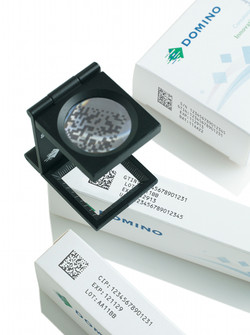Most drugmakers agree serialisation 'takes 4-5 years'
Phil Taylor, 01-Nov-2013
 Around half of mid-size pharmaceutical manufacturers agree that it will take four to five years to fully implement a serialisation programme, says a new survey.
Around half of mid-size pharmaceutical manufacturers agree that it will take four to five years to fully implement a serialisation programme, says a new survey.
Serialisation is widely expected to be the required safety measure - along with tamper-evident seals - to emerge from the delegated act procedure next year as the EU introduces additional legislation to implement the 2011 Falsified Medicines Directive (FMD).
The poll by Domino Printing indicated that 40 per cent of mid-size pharma manufacturers and contract packagers polled thought that four to five years was "more than adequate", while 10 per cent thought it would take longer.
The finding suggests that companies which have yet to make a start on implementation could find it difficult to meet the deadline for the FMD, which could see the coding requirement becoming mandatory in 2017, particularly as vendors of serialisation technologies and services suggest access to expertise could be a bottleneck as the deadline draws near.
One respondent noted: "Implementing serialisation affects a large number of organisational units in a company. From that perspective, the serialisation project is as complex as any enterprise resource planning (ERP) or manufacturing executive system (MES) deployment and should be approached with the same degree of care."
Another noted that implementation of hardware on the line and getting electronic batch records and MES aligned with the serialisation software would pose a significant hurdle, while implementing data capture and uploading the required serialisation data to the central repository, were two other areas of concern for respondents.
The survey revealed other points of contention with the FMD. For example, opinion was divided on the question of who should bear responsibility for funding the data repositories associated with FMD compliance.
Half of the respondents believe responsibility should lie with the Manufacturing Authorisation Holder, with 30 per cent saying this should be laid at the door of the Marketing Authorisation Holder and the remainder suggested variously that regulators, local supervising authorities and manufacturers, packagers and other ‘e-pedigree’ stakeholders should contribute.
The survey also highlighted the concern among manufacturers about how the implementation of serialisation will impact productivity, with over half believing that overall equipment effectiveness (OEE) will be reduced, in some cases by as much as 20 per cent.
Of the remainder, a quarter forecast no change, while on a more positive note, 20 per cent predicted a positive impact on OEE of up to 10 per cent associated with the implementation of serialisation.
The thorny topic of aggregation - linking the individually serialised pack to cartons, cases and pallets used in shipping - was also covered, with Domino asking whether an anti-counterfeit system could work without it, even though it is not expressly specified in the FMD.
Almost 70 per cent of respondents believed that schemes to prevent falsification can work without aggregation. "If scanning only takes place at point of dispensing then aggregation is not needed," said respondent commented.
Others felt that capturing data at points through the supply chain, including wholesalers and distributors, would both strengthen schemes and make them more efficient and transparent. One respondent went so far as to argue that aggregation is necessary, not only for medicines but for medical devices too.
"The survey highlights just how far the industry still has to go in agreeing the best way to address the challenge posed by compliance with the FMD," said Craig Stobie, global life sciences sector manager at Domino.
The survey also delved into some of the other issues exercising the minds those in the pharma industry concerned with implementing the FMD, says Domino.
"Securing funding and buy-in from senior stakeholders was expected by some to be the greatest hurdle, while for others, communicating the urgency and scale of the challenge at an organisational level was most significant," it noted.
The poll also found that 80 per cent of respondents think counterfeiting is as much of a problem for generics as it is for branded pharmaceuticals.
"There’s no doubt that manufacturers recognise that serialisation is the best means at their disposal in the battle against falsified medicines and most are doing their utmost to meet the deadline," said Stobie.
All told, 22 companies participated in the survey and included pharmaceutical research companies, manufacturers, distributors, and enterprise resource planning (ERP) vendors.

©
SecuringIndustry.com




 Around half of mid-size pharmaceutical manufacturers agree that it will take four to five years to fully implement a serialisation programme, says a new survey.
Around half of mid-size pharmaceutical manufacturers agree that it will take four to five years to fully implement a serialisation programme, says a new survey.